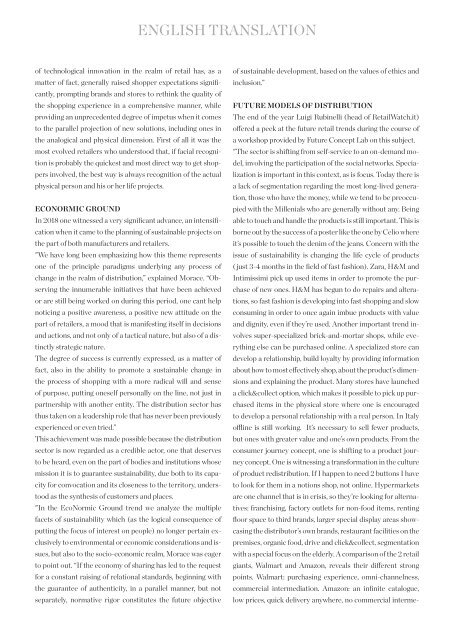Create successful ePaper yourself
Turn your PDF publications into a flip-book with our unique Google optimized e-Paper software.
ENGLISH TRANSLATION<br />
of technological innovation in the realm of retail has, as a<br />
matter of fact, generally raised shopper expectations significantly,<br />
prompting brands and stores to rethink the quality of<br />
the shopping experience in a comprehensive manner, while<br />
providing an unprecedented degree of impetus when it comes<br />
to the parallel projection of new solutions, including ones in<br />
the analogical and physical dimension. First of all it was the<br />
most evolved retailers who understood that, if facial recognition<br />
is probably the quickest and most direct way to get shoppers<br />
involved, the best way is always recognition of the actual<br />
physical person and his or her life projects.<br />
ECONORMIC GROUND<br />
In 2018 one witnessed a very significant advance, an intensification<br />
when it came to the planning of sustainable projects on<br />
the part of both manufacturers and retailers.<br />
"We have long been emphasizing how this theme represents<br />
one of the principle paradigms underlying any process of<br />
change in the realm of distribution,” explained Morace. “Observing<br />
the innumerable initiatives that have been achieved<br />
or are still being worked on during this period, one cant help<br />
noticing a positive awareness, a positive new attitude on the<br />
part of retailers, a mood that is manifesting itself in decisions<br />
and actions, and not only of a tactical nature, but also of a distinctly<br />
strategic nature.<br />
The degree of success is currently expressed, as a matter of<br />
fact, also in the ability to promote a sustainable change in<br />
the process of shopping with a more radical will and sense<br />
of purpose, putting oneself personally on the line, not just in<br />
partnership with another entity. The distribution sector has<br />
thus taken on a leadership role that has never been previously<br />
experienced or even tried.”<br />
This achievement was made possible because the distribution<br />
sector is now regarded as a credible actor, one that deserves<br />
to be heard, even on the part of bodies and institutions whose<br />
mission it is to guarantee sustainability, due both to its capacity<br />
for convocation and its closeness to the territory, understood<br />
as the synthesis of customers and places.<br />
"In the EcoNormic Ground trend we analyze the multiple<br />
facets of sustainability which (as the logical consequence of<br />
putting the focus of interest on people) no longer pertain exclusively<br />
to environmental or economic considerations and issues,<br />
but also to the socio-economic realm, Morace was eager<br />
to point out. “If the economy of sharing has led to the request<br />
for a constant raising of relational standards, beginning with<br />
the guarantee of authenticity, in a parallel manner, but not<br />
separately, normative rigor constitutes the future objective<br />
of sustainable development, based on the values of ethics and<br />
inclusion.”<br />
FUTURE MODELS OF DISTRIBUTION<br />
The end of the year Luigi Rubinelli (head of RetailWatch.it)<br />
offered a peek at the future retail trends during the course of<br />
a workshop provided by Future Concept Lab on this subject.<br />
"The sector is shifting from self-service to an on-demand model,<br />
involving the participation of the social networks. Specialization<br />
is important in this context, as is focus. Today there is<br />
a lack of segmentation regarding the most long-lived generation,<br />
those who have the money, while we tend to be preoccupied<br />
with the Millenials who are generally without any. Being<br />
able to touch and handle the products is still important. This is<br />
borne out by the success of a poster like the one by Celio where<br />
it’s possible to touch the denim of the jeans. Concern with the<br />
issue of sustainability is changing the life cycle of products<br />
( just 3-4 months in the field of fast fashion). Zara, H&M and<br />
Intimissimi pick up used items in order to promote the purchase<br />
of new ones. H&M has begun to do repairs and alterations,<br />
so fast fashion is developing into fast shopping and slow<br />
consuming in order to once again imbue products with value<br />
and dignity, even if they’re used. Another important trend involves<br />
super-specialized brick-and-mortar shops, while everything<br />
else can be purchased online. A specialized store can<br />
develop a relationship, build loyalty by providing information<br />
about how to most effectively shop, about the product’s dimensions<br />
and explaining the product. Many stores have launched<br />
a click&collect option, which makes it possible to pick up purchased<br />
items in the physical store where one is encouraged<br />
to develop a personal relationship with a real person. In Italy<br />
offline is still working. It’s necessary to sell fewer products,<br />
but ones with greater value and one’s own products. From the<br />
consumer journey concept, one is shifting to a product journey<br />
concept. One is witnessing a transformation in the culture<br />
of product redistribution. If I happen to need 2 buttons I have<br />
to look for them in a notions shop, not online. Hypermarkets<br />
are one channel that is in crisis, so they’re looking for alternatives:<br />
franchising, factory outlets for non-food items, renting<br />
floor space to third brands, larger special display areas showcasing<br />
the distributor’s own brands, restaurant facilities on the<br />
premises, organic food, drive and click&collect, segmentation<br />
with a special focus on the elderly. A comparison of the 2 retail<br />
giants, Walmart and Amazon, reveals their different strong<br />
points. Walmart: purchasing experience, omni-channelness,<br />
commercial intermediation. Amazon: an infinite catalogue,<br />
low prices, quick delivery anywhere, no commercial interme-


















